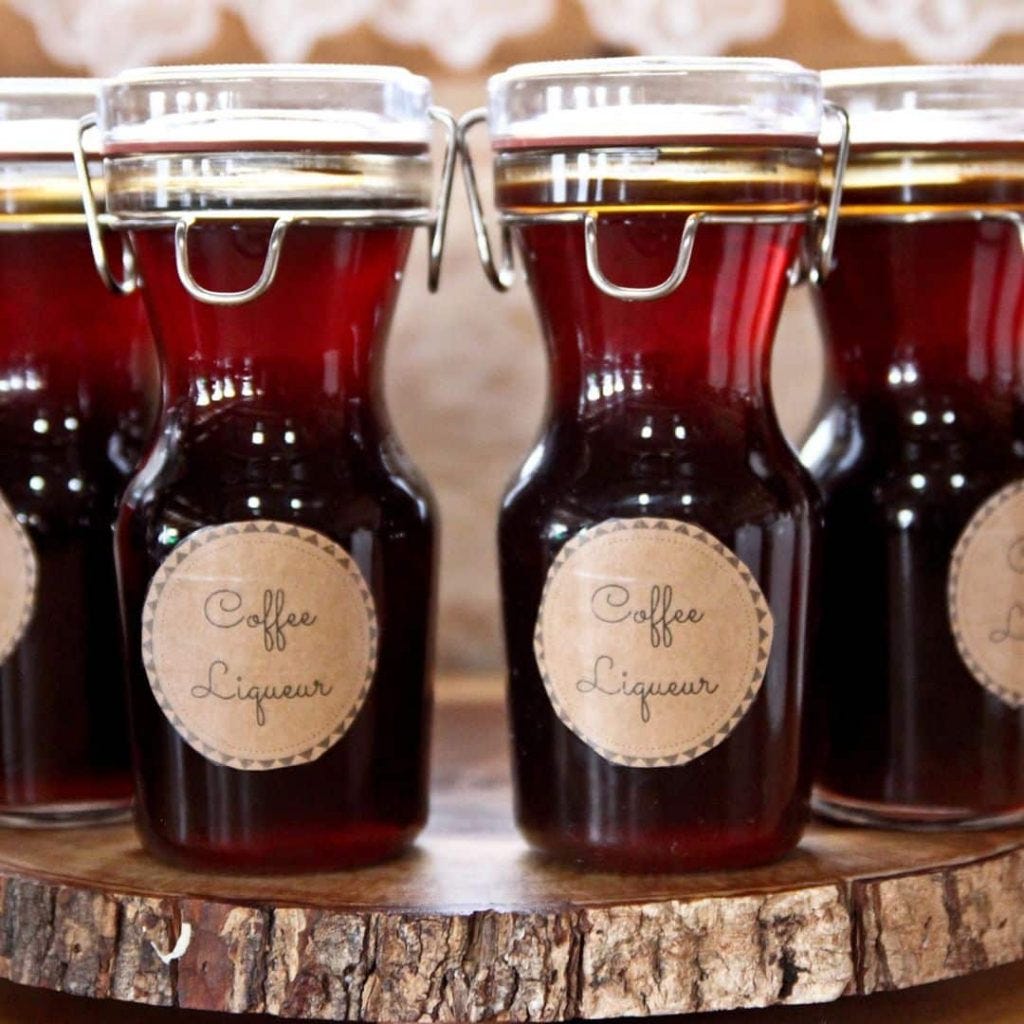“With leftover coffee and minimal labor, you will prepare a perfect concoction for personal use or a unique gift for someone who loves the taste of coffee”.
Buongiorno amici:
Today, I would like to share a recipe for leftover coffee. If you make the typical Neapolitan mocha coffee on the stovetop or have one of those pod machines, preserving the excess liquid may offer several alternatives. Of course, the espresso type of coffee will give you a more substantial strength, but even the typical American brewed type can provide a good liqueur, although less powerful, even if you use the dark roast.
Often, we brew more coffee than necessary and tend to discard the unused amount. Instead, we can make ice coffee or freeze it in ice cube trays for later use. In the epilogue of this writing, I include several ways that use leftover coffee. In Sicily, for instance, mixing old coffee with ground-up ice makes a delicious granita, a refreshing alternative during hot weather.
We all love coffee liqueur, mainly when used in Martinis and other delectable mixes. We treasure its scent and its unmistakable taste, and the sensory experience that it provides. I am sure you have tried the renowned Kahlua from Mexico or the Luxardo brand from Italy. (Kahlua differs from the other because it contains a percentage of dark rum).
But I have another use for the leftover. I make an excellent liqueur that I drink at the end of my meals or during a coffee break, a must-do for Italians. The procedure in making it is effortless and rapid. Follow these steps, and you’ll have your treasure to show off.
Here are the ingredients for the preparation:
10 ounces of bitter leftover espresso or mocha coffee (you can use strong, dark American coffee as well)
Five ounces of pure alcohol or inexpensive unflavored vodka
Five ounces of organic granulated cane sugar
1) Pour the leftover coffee into a medium-size saucepan, and combine with sugar. Bring to a boil on a very low flame. You want the sugar to incorporate slowly, break down its particles, and dissolve properly.
Stir the liquid with a wooden spoon. The total simmering time runs around 10 minutes.
Turn off the heat, pour the liquid into a large metal bowl, and cool completely to the touch.
Add the alcohol and mix well. Next, pour the ready coffee liqueur into washed, cleaned, and dried glass bottles. Store your new creation in a place protected from light and heat sources and wait a couple of weeks before drinking it. If you have done everything perfectly as described, you will be able to enjoy our liqueur for up to 90 days from when bottled, but I doubt it will last the period.
{Note} This recipe is the easiest for you to attempt as a starter. You cal also add a cinnamon stick, orange rind, cocoa nibs, and vanilla beans during the boiling process at step one. In this case, you will need to filter the finished product through a double coffee filter.
{Image Attribution via walkerland.ca}
Other applications for leftover coffee.
1) Leftover Coffee Chocolate Cake
Chocolate and coffee are a match made in heaven. The bitterness in coffee cuts through the sweetness in chocolate, lending a slightly savory and complicated note to cake recipes. Replace milk with room-temperature coffee in your recipe. Infuse your cake with a delectable mocha flavor.
2) Leftover Coffee Overnight Oatmeal
Overnight oatmeal is an excellent health and wellness trend. Add a coffee infusion to your overnight oatmeal. Add less of your liquid of choice (milk or water) and incorporate about a quarter cup of coffee into the mix. If the mixture is too soggy in the morning, you can always add chia seeds to firm it up.
3) Leftover Coffee Ice Cream
Once you’ve made ice cream at home, you’ll never settle for the store-bought variety again. You can make a coffee ice cream with milk, sugar, cream, vanilla, and a splash of coffee. If you’re craving a little more complexity, feel free to add chocolate, nuts, or different spices to form your signature blend.
4) Leftover Coffee Ice Cubes
Never drink diluted ice coffee again. Pour your leftover coffee into an ice-cube tray and freeze it for future use. Throw the cubes into your iced coffee or even blend them up with chocolate milk for a tasty cold frappuccino.
5) Leftover Coffee Tiramisu
Everyone’s favorite Italian delicacy can be made even more delicious with some leftover coffee. It’s impossible to make tiramisu without the addition of some robust and room-temperature coffee. You’ll need at least two cups of brew to get that irresistible mocha flavor.
6) Leftover Coffee Mole
Mole is a Mexican sauce that hits on all flavor profiles for a one-of-a-kind culinary experience. Making a traditional mole might be varsity level cooking, but there’s a better and easier way to get those flavors. Make a quick and delicious mole just by adding just a splash of coffee. Coffee will mimic some of the earthy flavors and pair well with chocolate and chipotle. Enjoy your mole on eggs, chicken, or as a dipping sauce.
7) Leftover Coffee BBQ Sauce
Leftover coffee is a stand-out secret ingredient in the best barbeque sauces. Its earthy, complex flavor lends a savory and slightly bitter note to the sauce, pairing perfectly with acidic notes from tomatoes and vinegar zing. Use your leftover coffee barbeque sauce as a marinade for meats or as a dipping sauce. You only need about half a cup to take your sauce to the next level. You’ll get rave reviews from friends and family on this incredible sauce.
8) Leftover Coffee Mocha Pudding
Mix up a batch of your favorite chocolate pudding, either from scratch or from a box, and stir in a bit of room-temperature coffee. Congratulations, you’ve elevated your pudding and mixed up a tempting creamy treat.
9) Leftover Coffee Pot Roast
Give your pot roast recipe an upgrade by adding half a cup of strong coffee to the crockpot. All you need to do is brown your meat, pop it in the Crockpot with chopped veggies and spices, and add a little bit of broth and a little bit of coffee. The coffee will infuse your meat and vegetables with a delicious flavor as it cooks low and slow for several hours. Give your traditional pot roast a savory, complex flavor by adding coffee.
10) Leftover Coffee Frosting
Give your frosting a makeover with some leftover coffee. Make a standard buttercream or icing recipe and add in a splash of coffee for a unique flavor. Add some chocolate to make a chocolate frosting to die for, or even experiment with other flavors.
Before you throw that last bit of coffee down the sink, consider trying one of these leftover coffee recipes. It doesn’t matter whether your recipe is sweet or savory. Coffee will add a flavor note that’s not duplicated by any other ingredient. (Trusted Source)
Thanks for reading. Eat safe! Ciao Chef W
Download Chef Walters E-Books
Would you mind tuning in to our latest Flavors + Knowledge Podcast
Subscribe to the Italian version SAPERE + SAPORI
Subscribe to News you can eat 24 Video-Cast on YouTube
Support Chef Walters Children’s Diabetes Foundation
For recipes, visit the chef blog.

Note: The views and opinions expressed in the Flavors and Knowledge newsletters are those of the authors and do not necessarily reflect Flavors and Knowledge’s official policy or position. Our blogger’s or authors’ content is of their opinion and not intended to malign any religion, ethnic group, club, organization, company, individual, or anyone. Any general advice posted on our blog, website, or app is only for informational purposes and, without any intentions, to replace any medical or other advice.
| 4 |


















